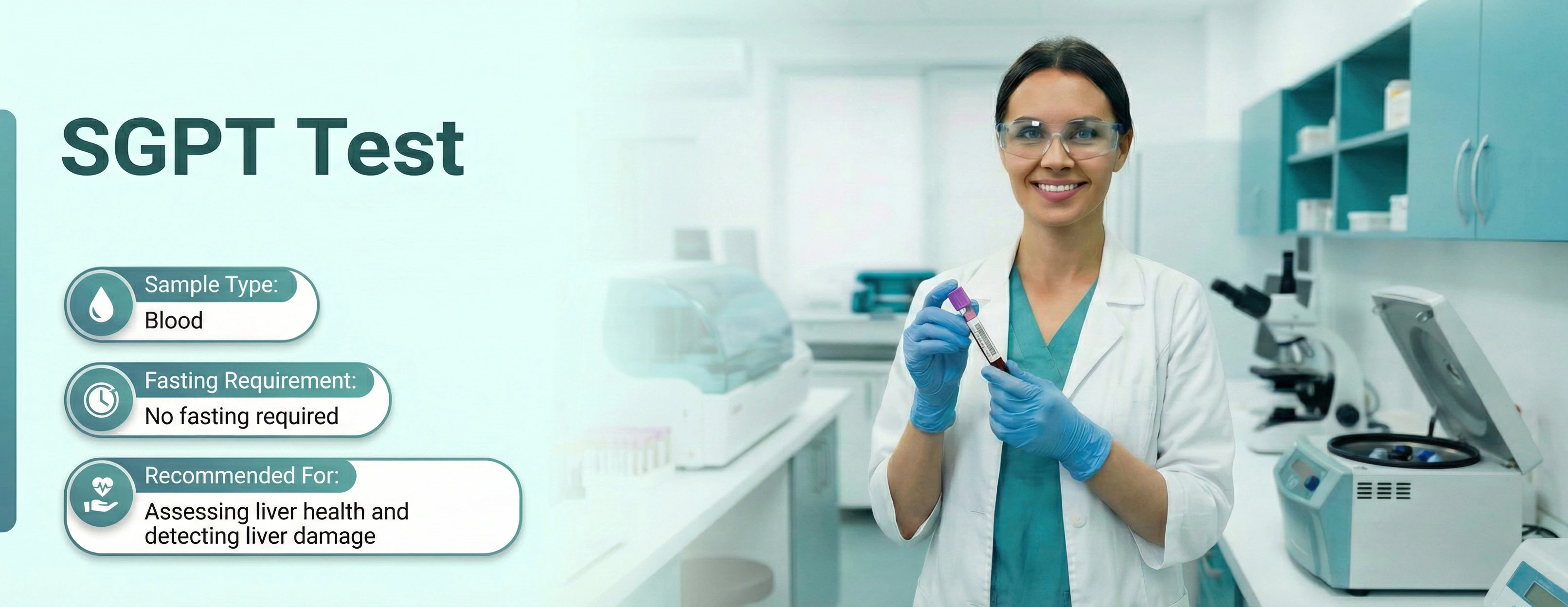926+ orders placed in your location
100% NABL & ISO Certified Lab • 100% Accurate Reports
SGPT / ALT (Alanine Transaminase) Test
Serum Glutamic-Pyruvic Test (SGPT), Alanine Aminotransferase Test (ALT), Glutamic-Pyruvic Test (GPT)
- SummaryThe Alanine Transaminase (SGPT / ALT) test is a blood test that helps to detect some liver disorders. It measures the amount of ALT, an enzyme primarily found in liver cells. The SGPT test is done by taking a blood sample from the vein in your arm, fasting is not required for this test. Read more
- Reports Within10 HrsView Sample Report100% NABL & ISO Certified Labs
- SampleBlood
- AgeAll Age Group
- GenderMale and Female
- FastingNot Required
PharmEasy Promises
Know More About The Test
A SGPT / ALT Test Reference Ranges
Overview
The SGPT (ALT) test, with ALT standing for alanine aminotransferase, is a blood test used to detect liver damage. The liver is one of the important organs of the human body carrying out several vital roles. The liver helps produce bile, which in turn helps to digest food. It also helps remove waste products and toxins from the blood and produce proteins and cholesterol.
Occurrence of diseases such as cirrhosis and hepatitis or intake of certain drugs can cause harm to the liver.
The enzyme alanine aminotransferase is mainly found in the liver. The body uses this ALT enzyme for the breakdown of food and the production of energy. At normal times, ALT is found inside the liver cells. But in case of liver damage or disease, ALT is released into the bloodstream. This results in higher levels of ALT in the blood, often the first sign of liver damage.
The SGPT (ALT) test is therefore done to determine the levels of ALT in the blood. This would, in turn, help to determine liver damage or disease. Symptoms that call for the SGPT (ALT) test include dark urine, nausea, stomach pain, vomiting and yellowish eyes and skin. Patients with any of these symptoms are advised by doctors to undergo the test immediately.
Liver disease has been stated as the tenth most common disease in India by the World Health Organization. Liver diseases are known to affect every one in five Indians. The most common of them is cirrhosis. Currently, the primary cause of liver cirrhosis is excessive alcohol consumption, Hepatitis B and C and non-alcoholic fatty liver disease. Cirrhosis can be associated with other complications, such as ascites, variceal bleeding and other infections.
Sample Type
Blood samples are required to carry out the SGPT (ALT) test. Most often, the blood is collected from a vein in the arm.
Risk Assessment
Cirrhosis, Hepatitis, Liver Cancer, Mononucleosis
What does this test detect?
The SGPT (ALT) test measures the ALT level in the blood, which helps to indicate the presence of any liver damage or liver disease.
Indications for SGPT Test
The test is prescribed by doctors for individuals who have symptoms of liver damage or disease that includes:
- Pain in the stomach, along with swelling
- Vomiting
- Nausea
- Yellow eyes and skin
- Fatigue
- Weakness
- Dark-coloured urine and light-coloured poop
- Itchy skin
A few other reasons why an individual may be prescribed the test are:
- Exposure to the hepatitis virus
- Excessive consumption of alcohol
- A family history of liver disease
- Intake of medication known to cause liver damage
- To monitor the progression of liver disease
- To evaluate whether treatment for liver diseases might be implemented
- To determine whether and how well the treatment is working
Routine Health Check / Preventive Screening
Doctor Recommendation
Follow-up / Monitoring
How frequently should you take this test?
The SGPT (ALT) test is helpful for the determination of liver damage or disease. If the test results indicate the presence of liver damage, further assessments are done to determine the cause of the liver disease. The doctor might prescribe medications based on the cause of the disease.
In such cases, patients may be advised to retake the test after one cycle of the medication is completed to determine if the disease has been healed or to detect the disease progression better.
If the results do not indicate any liver damage or disease, the tests may be done once a year as a part of an individual’s routine checkup.
Test Preparation
Before the Test
Generally, no special preparations are required for the SGPT test. The patients may be asked not to eat anything 8 to 12 hours before the test. If your doctor recommended this test along with another one, your healthcare provider may advise avoiding certain foods. It is always a good idea to consult your doctor before any test for the best results.
During the Test
A blood sample will be taken from a vein in your arm. Here is what you can anticipate during the test:
- The phlebotomist will cleanse the area where the needle will be inserted with an antiseptic.
- A tourniquet will be placed around your arm to make the veins more prominent.
- A needle will be inserted into the vein to draw blood. This process may cause a brief pinch that lasts a few seconds.
- The blood will be collected in a vial, or small test tub,e and a label on the vial will be filled up with your information.
After the Test
Once the blood has been collected:
- A bandage will be applied to the puncture site to stop any bleeding.
- Mild bruising is normal. Some people feel dizzy, and in such cases, they are advised to sit for a few minutes.
- If you notice bleeding, pain, or rashes at the puncture site, contact your healthcare provider.
Parameters
The only parameter included in the test is the level of ALT in blood. This level helps to determine either the presence or absence of liver disease. Low levels of ALT are normal, whereas higher ALT levels are of concern as they are indicative of liver disease.
Ranges
The normal range of ALT in the blood is generally considered to be less than 35 units per litre of blood. If the results are higher than this, it may suggest the presence of liver damage or disease. However, this range can be affected by a few factors, such as age and gender. Therefore, the result must be specifically discussed with doctors.
The following table indicates the variations that may be seen in the normal range of ALT in different age groups, both in females and males:
Age | Female U/L | Male U/L |
Newborns up to 12 months | 13 to 45 | 13 to 45 |
1 to 60 years | 7 to 35 | 10 to 40 |
60 to 90 years | 10 to 28 | 13 to 40 |
Older than 90 years | 5 to 24 | 6 to 38 |
The normal values and reference ranges of the test may vary from lab to lab. Please refer to the ranges mentioned in the report and consult a doctor to understand the interpretation of lab reports.
Test Result Interpretation
If the range of ALT is found to be higher than the normal range, it may suggest the presence of liver damage or disease. Increased ALT can result from several conditions, such as:
- Cirrhosis
- Hepatitis
- Death of liver tissue
- Cancer or tumour in liver
- Lack of blood flow to the liver.
- Hemochromatosis, which is the build-up of iron in the body
- Mononucleosis, which is an infection caused by the Epstein-Barr virus
- Pancreatitis
If the results indicate liver disease or damage, the patients might have to undergo further tests to determine the cause of the problem and also the best way it can be treated.
Most often, lower levels of ALT are suggestive of a healthy liver. However, recent studies have found lower than normal levels of ALT may be associated with increased mortality. Therefore, in both cases, the test results must be consulted with a doctor.
Price / Cost
The price of an SGPT Test can differ based on the city and the laboratory. Typically, an SGPT test falls within the range of INR 169 to INR 399. For a better understanding, here is the average cost of an SGPT test in some major cities in India:
City | Min Price | Average Price | Max Price |
169 | 284 | 399 | |
169 | 284 | 399 | |
169 | 284 | 399 | |
169 | 284 | 399 | |
169 | 284 | 399 | |
169 | 284 | 399 | |
169 | 284 | 399 | |
169 | 284 | 399 | |
169 | 284 | 399 | |
169 | 284 | 399 |
Risks and Limitations
The SGPT blood test is accompanied by a low chance of complications.
However, seek medical advice should these issues crop up
- Unabated bleeding at the blood-extraction site
- Pain or inflammation at the puncture.
Limitations of the test
- Potential inaccuracies due to equipment errors or human mistakes
- Misinterpretation of markers results in unreliable conclusions.
Was This Test Information Helpful?
Please rate your experience
References
Health packages containing 'SGPT / ALT (Alanine Transaminase) Test'
People Also Ask
What happens if SGPT is high?
How can I lower my SGPT level?
What should be avoided by patients with high SGPT?
Is high SGPT curable?
What is SGPT in liver tests?
Have any doubts? Ask us.
Ask us anything about the SGPT / ALT (Alanine Transaminase) Test to understand it better
Explore More at PharmEasy
Top-Selling Healthcare Products
We provide trusted, expert-curated health content to support better awareness,prevention, and care.
Backed by experienced doctors, medical experts, and strict editorial standards.


